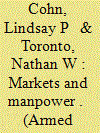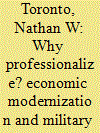| Srl | Item |
| 1 |
ID:
153623


|
|
|
|
|
| Summary/Abstract |
Economic studies of military manpower systems emphasize the advantages of voluntarism under all but the most total threats, but this explains neither the persistence of institutionalized conscription in many states nor the timing of shifts from such conscription systems to volunteer militaries. Traditional explanations focus on external threat levels, but this has also proven unsatisfying. We theorize that threat variables establish the state’s baseline need for manpower, but structural economic variables determine whether the necessary manpower can be more efficiently obtained by conscription or voluntarism. Using a new data set of 99 countries over 40 years, we find that states with British origins are less likely and those experiencing greater external threat are more likely to employ conscripts. Most importantly, states with more highly regulated labor markets are more likely to employ conscripts, which suggests that, controlling for a number of relevant factors, labor markets matter in military manpower decisions.
|
|
|
|
|
|
|
|
|
|
|
|
|
|
|
|
| 2 |
ID:
159569


|
|
|
|
|
| Summary/Abstract |
Why do states professionalize the military? Professionalizing the military represents a strategic commitment to a particular set of ideas about the role of the military, and the timing and strength of this commitment to military professionalism have varied widely between countries, especially non-European ones. Understanding this process is important in an era of defense austerity, when the choice of how to spend defense resources has deeper political consequences than it used to. Despite the importance of this question, there have been almost no large-n studies of military professionalization. Analyzing new data on more than 150 countries from 1800 to 2005, this study finds that states with greater levels of human capital, urbanization, and economic wealth are more likely to professionalize. What is more, these indicators of economic modernization have a substantially stronger correlation with measures of military professionalism than regime type and international security concerns. These findings should inform security assistance operations by emphasizing the development of human capital in recipient officer corps and drawing links between economic development and security assistance programs.
|
|
|
|
|
|
|
|
|
|
|
|
|
|
|
|